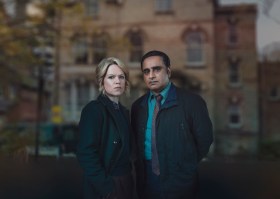Avrom Sutzkever, Abba Kover and Gershon Abramowicz from Chronicles of the Vilna Ghetto.
‘I think that in Israel, in every house, you could not believe that this is a story that nobody has heard of,’ says Hadas Kalderon, as she reflects upon the passing of her beloved grandfather, Avrom Sutzkever. Dubbed ‘the greatest poet of the Holocaust’ by the New York Times, Sutzkever used his extensive talents to document his experiences, but also to retain his culture and create a record of its resilience even in the darkest of days. His death in 2010 triggers Rohan Spong’s documentary examination of the interweaving of artistry into one of humanity’s biggest atrocities; however The Songs They Sang tells of more than his plight alone.
The city of Vilnius sits at the centre of a tapestry of tales that proves a testament to tenacity above all else. From 1941 to 1943 during the Second World War, the Lithuanian capital became a ghetto under Nazi occupation: work camps claimed older citizens and those less fortunate were killed. In stark contrast, the intellectual spirit of Vilnuis’s Jewish inhabitants persevered and theatrical productions also prospered against the odds, setting Sutzkever’s works to music. Alongside the similarly affecting efforts of activist and lyricist Shmerke Kaczerginski, the poems-turned-songs became the soundtrack to dark days of persecution, an outlet of catharsis for coping with the rampant suffering, and a performative act of defiance.
In The Songs They Sang, family members and survivors combine to furnish their recollections and re-heard accounts to camera, in a stylistically straightforward fashion suiting the solemnity of the subject. Specific to the dual catalysts for the film, Kalderon relays how Sutzkever believed that he defeated Hitler through his poems, while Kaczerginski’s daughter, Liliane Cordova, tells a similar narrative about her own her father, Kaczerginski – but theirs are just some of the stunning stories shared. Co-mingled throughout are renditions of the tunes that still resonate, haunting in both their words and melodies, and slowly monopolising the feature’s focus. The contrast between the first-hand renderings of death and destruction and the staging of soulful songs of sorrow, as further augmented through photographs from the time, is never less than striking.
In 2011, writer/director Spong offered All the Way Through Evening to the world, a rousing and riveting dissection of the HIV and AIDS crisis in New York City that moved not only in its meditations on an important and oft-overlooked area, but also in its amalgamation of music into the informative mix. In applying the same format to a different topic, his emotive and empathetic approach to historical misfortune remains in The Songs They Sang, as does his instinct for interesting figures and insightful conversations.
Where the filmmaker’s collected works resound is in the exploration of legacy, of how events of the past are remembered, how previous deeds shape the future, and what future generations must do to ensure significant chapters, however harrowing, aren’t forgotten. This documentary may be as blunt as the direct confessionals it is comprised of, but, again, it needs to be. Once more, Spong succeeds in his quest to make viewers think and feel about something likely unknown to them prior to watching – and in creating a sensitive and stirring swirling of tragedy and music.
Rating: 3 ½ out of 5 stars
The Songs They Sang
Director: Rohan Spong
Australia, 2014, 94 mins
Release date: June 11 – 28
Distributor: Backlot Studios
Rated: TBC
Actors:
Director:
Format:
Country:
Release:





